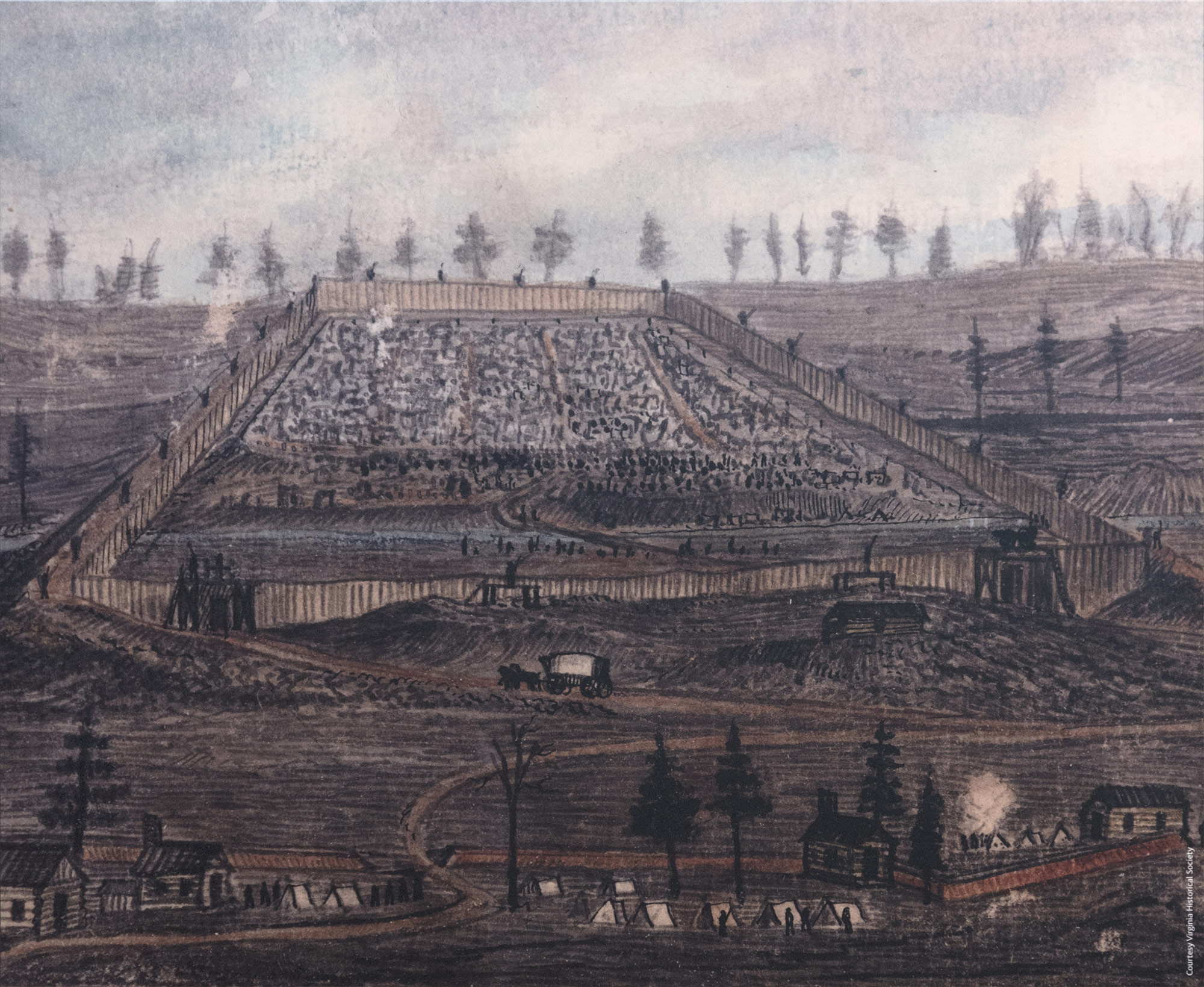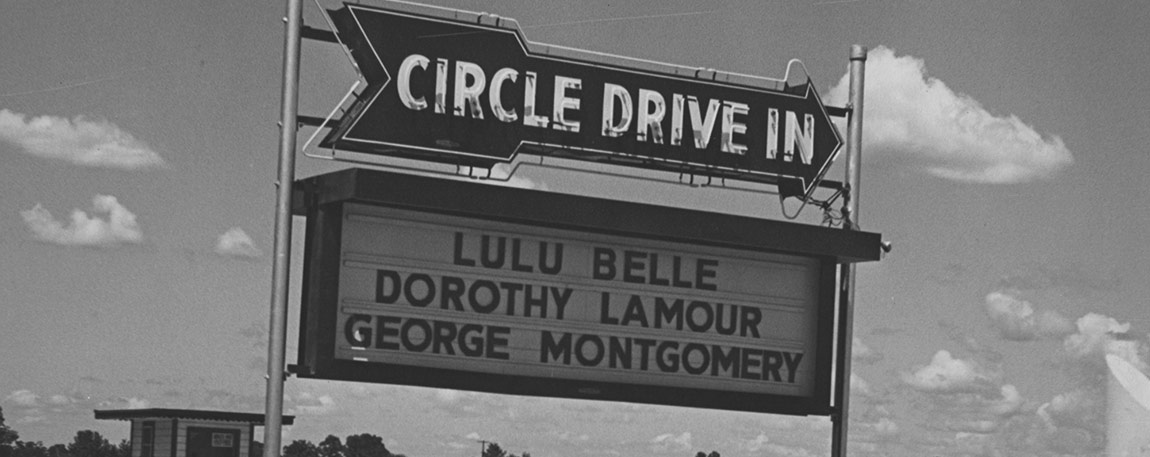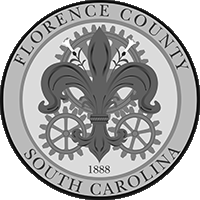The Florence Daily Times
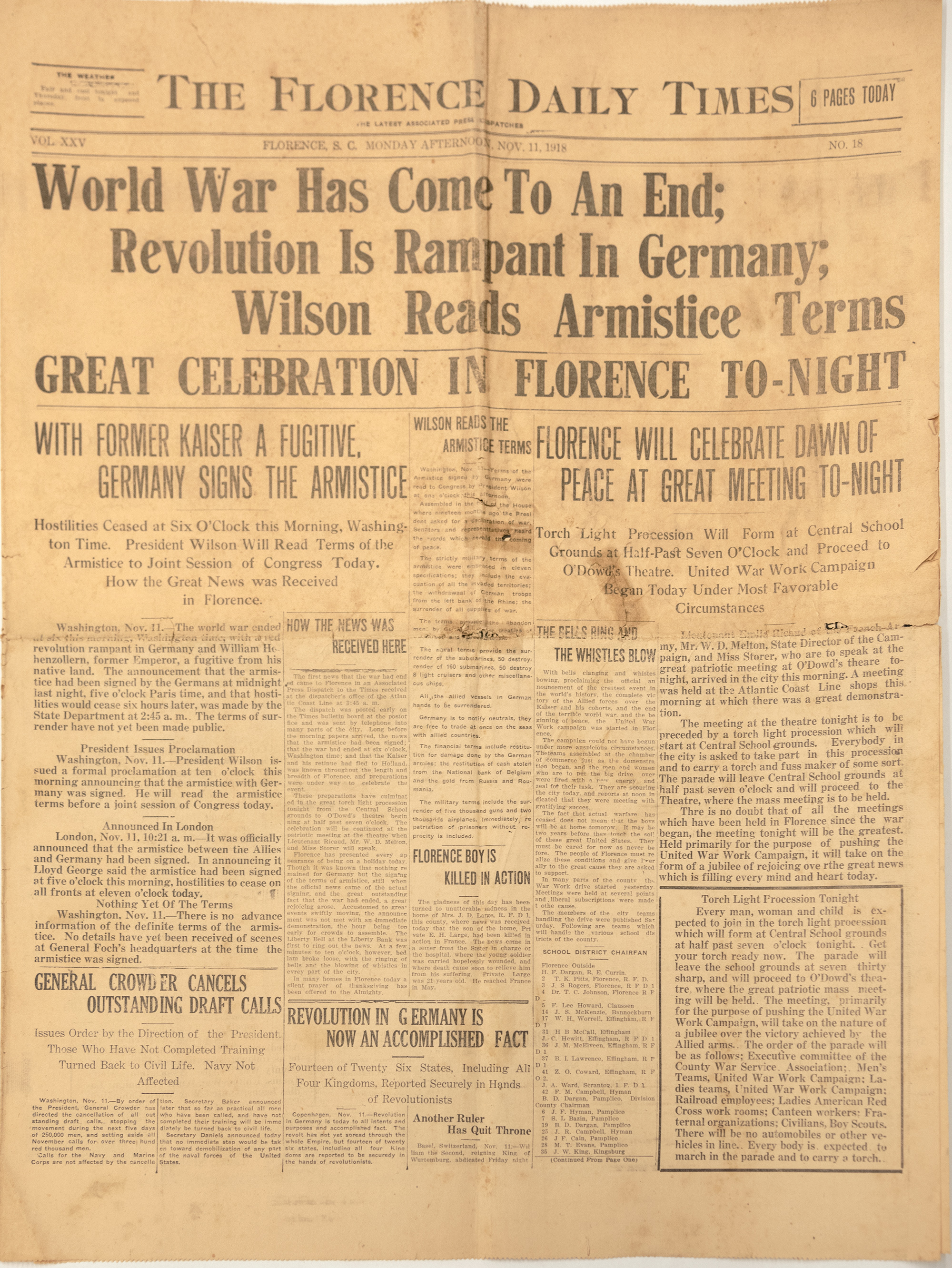

How the News was Received Here
The first news that the war had ended came to Florence in an Associated Press Dispatch to the Times received at the dispatcher’s office of the Atlantic Coast Line at 3:45 a. m.
The dispatch was posted early on the Times bulletin board at the postoffice and was sent by telephone into many parts of the city. Long before the morning papers arrived, the news that the armistice had been signed; that the war had ended at six o’clock, Washington time; and that the Kaiser and his retinue had fled to Holland, was known throughout the length and breadth of Florence, and preparations were under way to celebrate the event.
These preparations have culminated in the great torch light procession tonight from the Central School grounds to O’Dowd’s theatre beginning at half past seven o’clock. The celebration will be continued at the patriotic meeting at the theatre when Lieutenant Ricaud, Mr. W. D. Melton, and Miss Storer will speak.
Florence has presented every appearance of being on a holiday today. Though it was known that nothing remained for Germany but the signing of the terms of armistice, still when the official news came of the actual signing, and the great outstanding fact that the war had ended, a great rejoicing arose. Accustomed to great events swiftly moving, the announcement was not met with an immediate demonstration, the hour being too early for crowds to assemble. The Liberty Bell at the Liberty Bank was first to ring out the news. At a few minutes to ten o’clock, however, bedlam broke loose, with the ringing of bells and the blowing of whistles in every part of the city.
In many homes in Florence today a silent prayer of thanksgiving has been offered to the Almighty.
Liberty Loan Bank
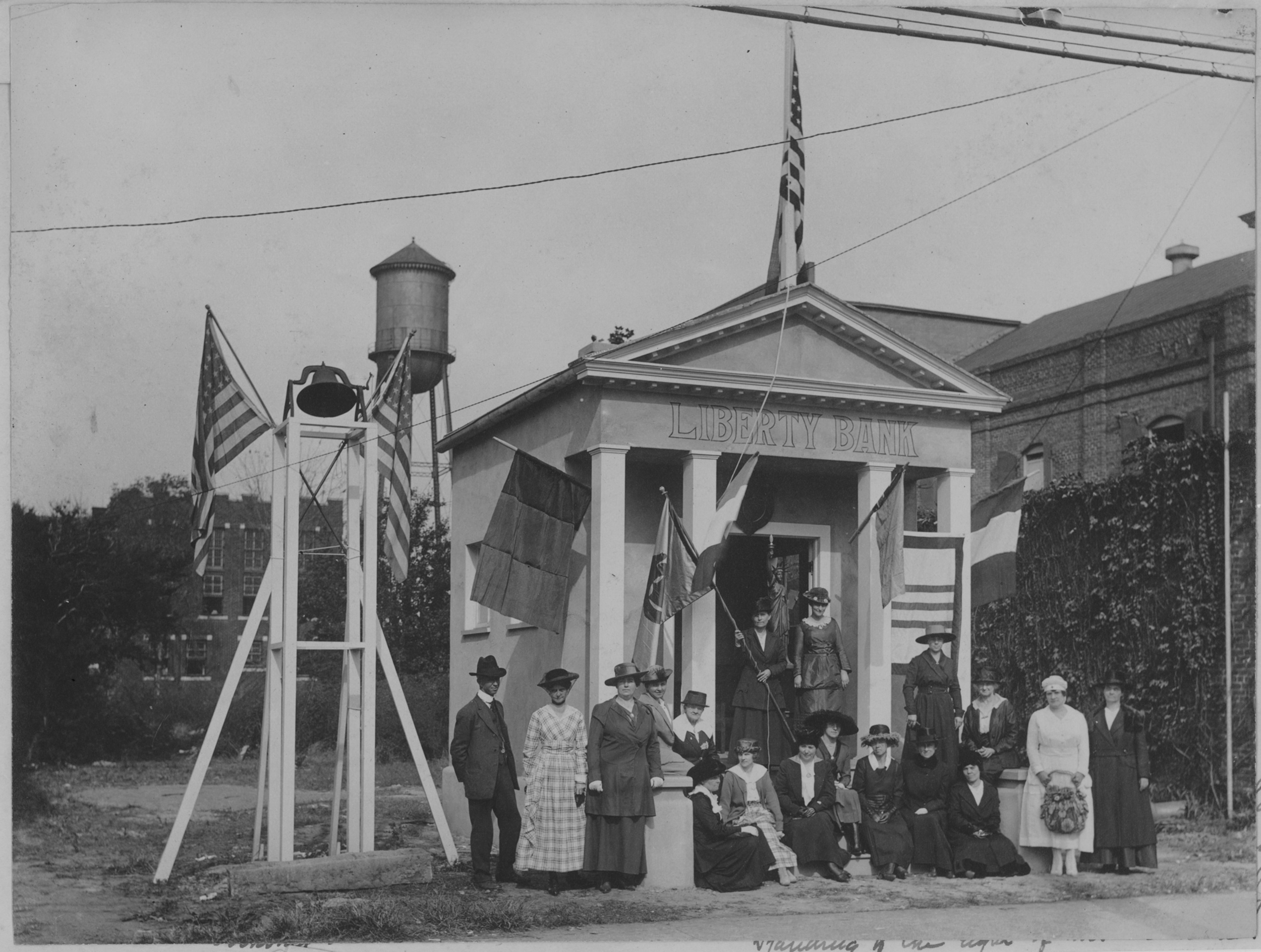
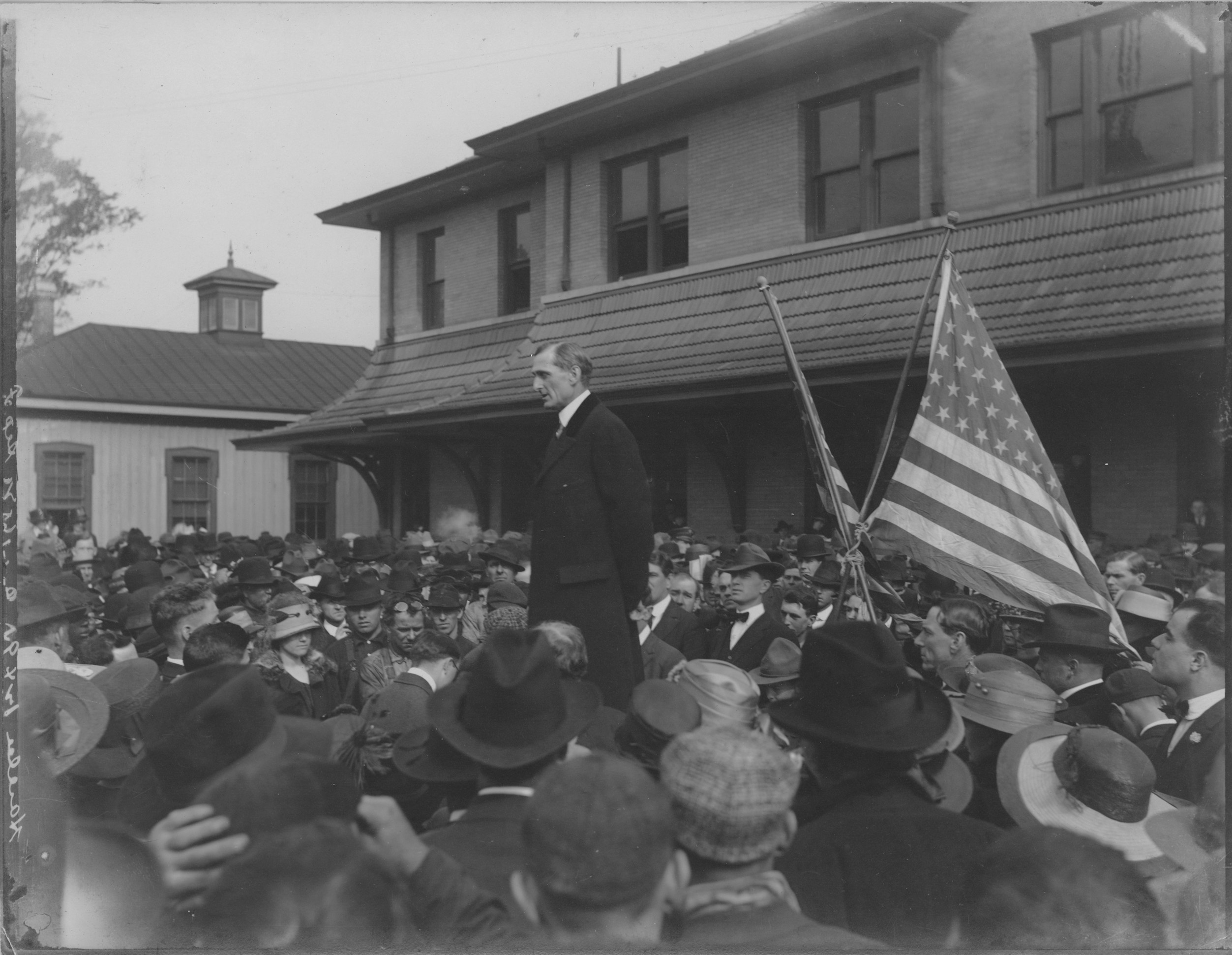
The Victory Loan
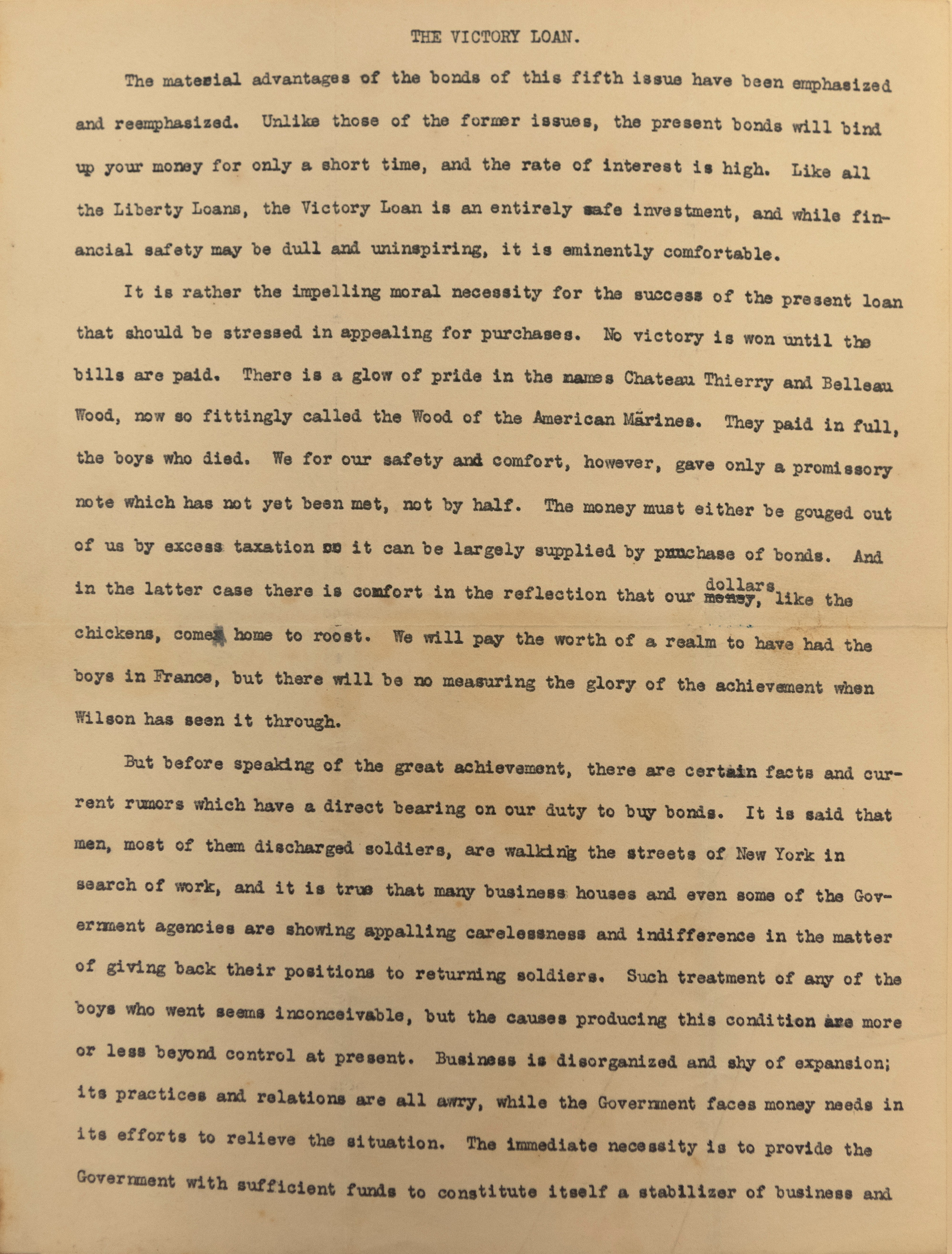
The Victory Loan.
The material advantages of the bonds of this fifth issue have been emphasized and reemphasized. Unlike those of the former issues, the present bonds will bind up your money for only a short time, and the rate of interest is high. Like all the Liberty Loans, the Victory Loan is an entirely safe investment, and while financial safety may be dull and uninspiring, it is eminently comfortable.
It is rather the impelling moral necessity for the success of the present loan that should be stressed in appealing for purchases. No victory is won until the bills are paid. There is a glow of pride in the names Chateau Thierry and Belleau Wood, now so fittingly call the Wood of the American Marines. They paid in full, the boys who died. We for our safety and comfort, however, gave only a promissory note which has not yet been met, not by half. The money must either be gouged out of us by excess taxation or it can be largely supplied by purchase of bonds. And in the latter case there is comfort in the reflection that our dollars, like the chickens, come home to roost. We will pay the worth of a realm to have had the boys in France, but there will be no measuring the glory of the achievement when (President Woodrow) Wilson has seen it through.
But before speaking of the great achievement, there are certain facts and current rumors which have a direct bearing on our duty to buy bonds. It is said that men, most of them discharged soldiers, are walking the streets of New York in search of work, and it is true that many business houses and even some of the Government agencies are showing appalling carelessness and indifference in the matter of giving back their positions to returning soldiers. Such treatment of any of the boys who went seems inconceivable, but the causes producing this condition are more or less beyond control at present. Business is disorganized and shy of expansion; its practices and relations are all awry, while the Government faces money needs in its efforts to relieve the situation. The immediate necessity is to provide the Government with sufficient funds to constitute itself a stabilizer of business and
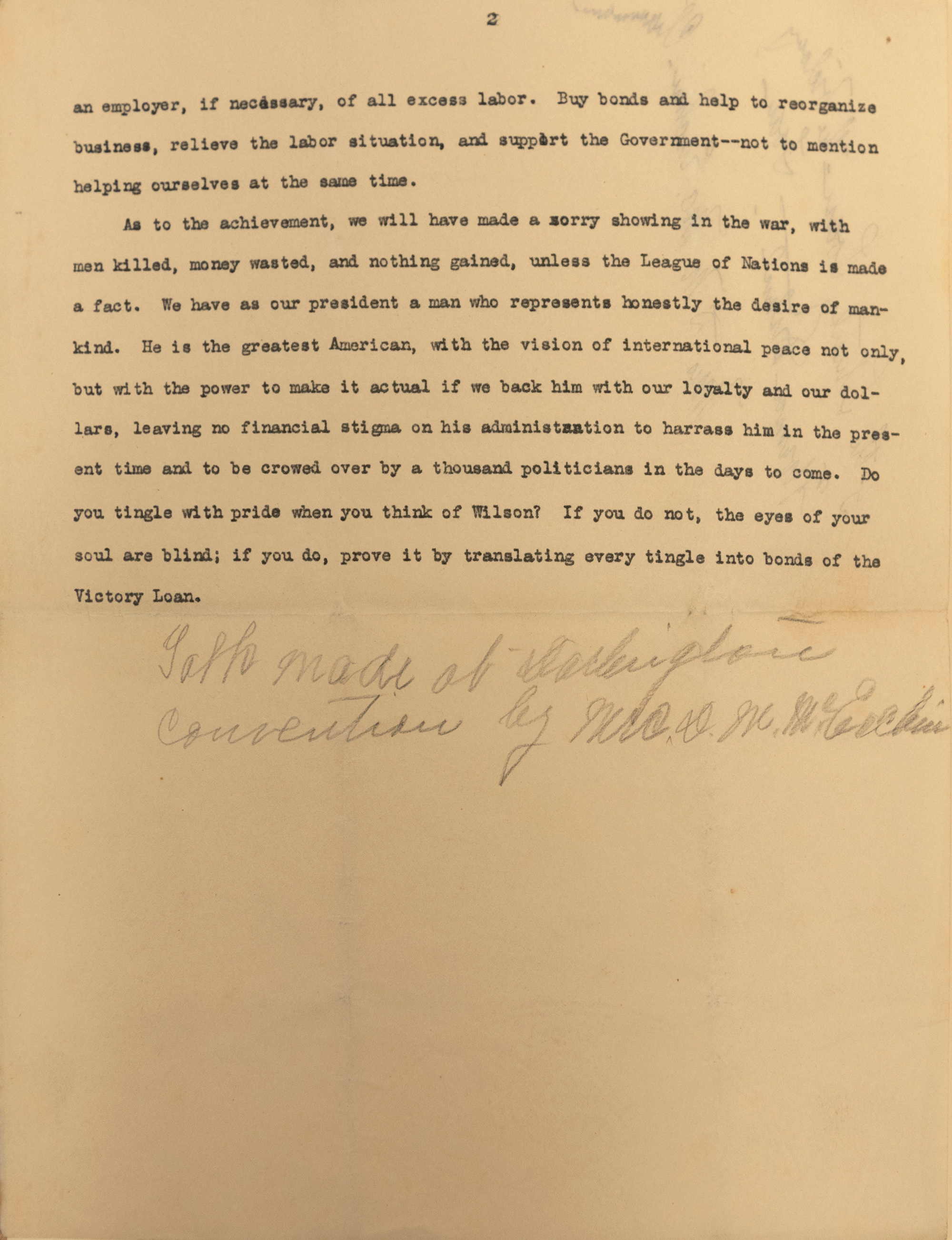
2
an employer, if necessary, of all excess labor. Buy bonds and help to reorganize business, relieve the labor situation, and support the Government—not to mention helping ourselves at the same time.As to the achievement, we will have made a sorry showing in the war, with men killed, money wasted, and nothing gained, unless the League of Nations is made a fact. We have as our president a man who represents honestly the desire of mankind. He is the greatest American, with the vision of international peace not only, but with the power to make it actual if we back him with our loyalty and our dollars, leaving no financial stigma on his administration to harass him in the present time and to be crowed over by a thousand politicians in the days to come. Do you tingle with pride when you think of Wilson? If you do not, the eyes of your soul are blind; if you do, prove it by translating every tingle into bonds of the Victory Loan.
Florence Library
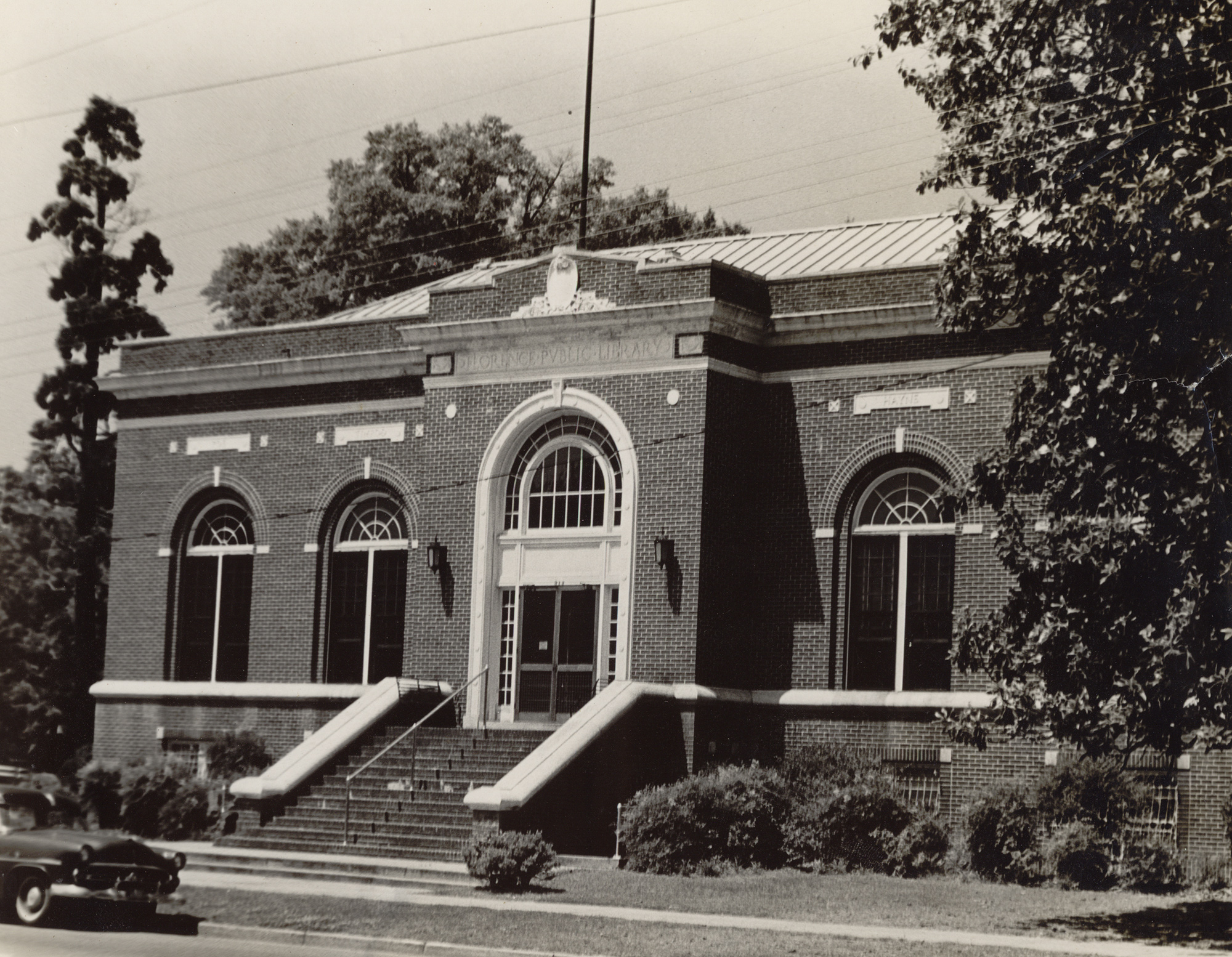
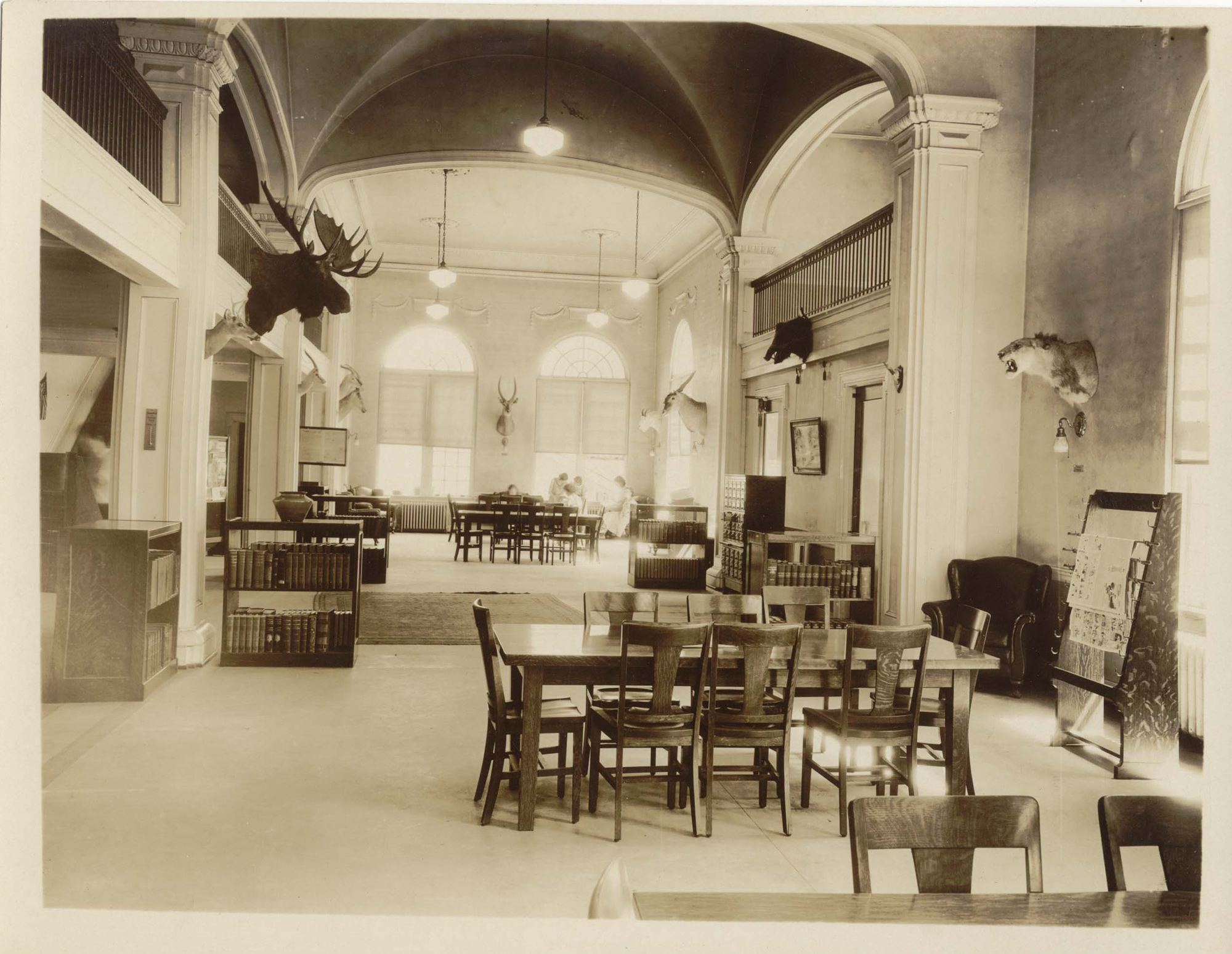
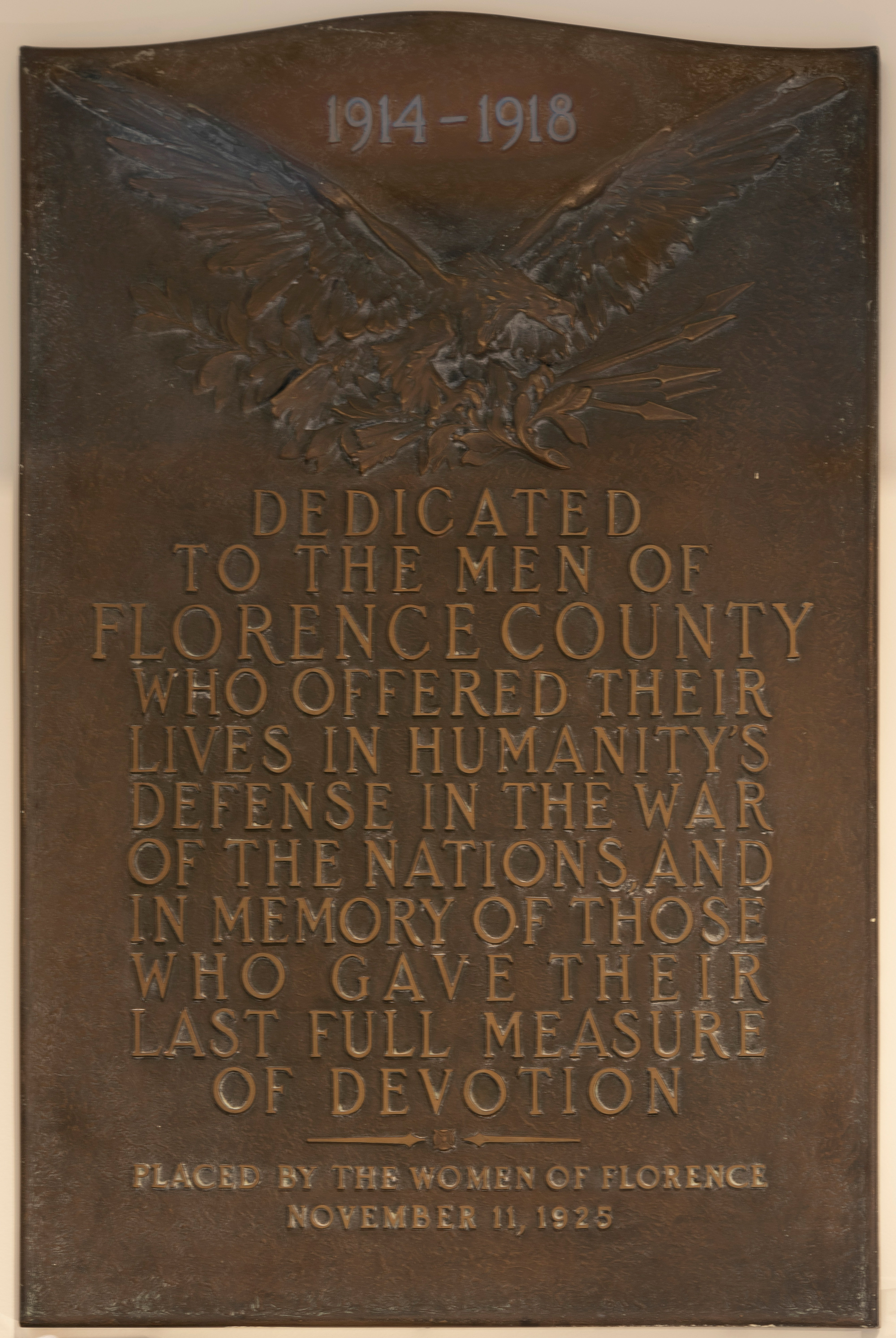
WWI memorial plaque
Cast bronze
1925
2013.24.1
From 1918 to 1923 Florence planned to build its first public library as a memorial to WWI. The building opened on November 11, 1925, the seventh anniversary of Armistice Day. A veterans parade through the city culminated in the opening of the library’s doors and the unveiling of this bronze plaque, purchased with funds from the Blue Bird Tea Room.
Inscription:
1914 - 1918
Dedicated to the men of Florence County who offered their lives in humanity’s defense in The War of the Nations and in memory of those who gave their last full measure of devotion
Placed by The Women of Florence
November 11, 1925

Unveiling Bronze Tablet Big Event of Armistice Day
Armistice day in Florence Wednesday, November 11, will be marked by the unveiling in the public library of the bronze tablet given by the women in honor of the boys of the country who served in the World war.
the occasion will be accompanied by most interesting exercises. The Hon. A. H. Gasque, congressman from the sixth district, will make the address of the occasion and the following will be the program:
Program
Line of march will form in front of post office at 4 o’clock promptly, march to library.
High school band.
American Legion rifle platoon, commanded by Col. Henry T. Thompson.
American Legion and World war veterans.
Boy Scouts.
American Legion Auxiliary.
United Daughters Confederacy.
National Society United States Daughters of 1813.
National Society Daughters American Revolution.
School children and the public.
Exercises in Library.
Prayer by Dr. H. Tucker Graham.
Tablet unveiled by Ex-sheriff Cole in Confederate uniform.
Tablet presented by Mrs. Dell Smith Williams.
Tablet accepted for library by Judge Harry A. Brunson.
Music by band, “America.”
Introduction of Hon. Allard Gasque, the speaker, by F. L. Wilcox.
Music, “Dixie.”
Music, “Star Spangled Banner.”
Benediction by Rev. Wilmer S. Poyner.
Concerning the Celebration
Mrs. Dell Williams, chairman, last night stated, “We want American Legion Auxiliary, United Daughters of the Confederacy, United States Daughters of 1812, Daughters of American Revolution, as well as World war veterans, Spanish-American veterans, and Confederate veterans, to be at post office at ten minutes to 4 o’clock to form a line of march to the library. We want the men who have received their service crosses to wear them, the daughters to wear all their patriotic insignia. Of course the Confederate veterans will wear their crosses of honor.
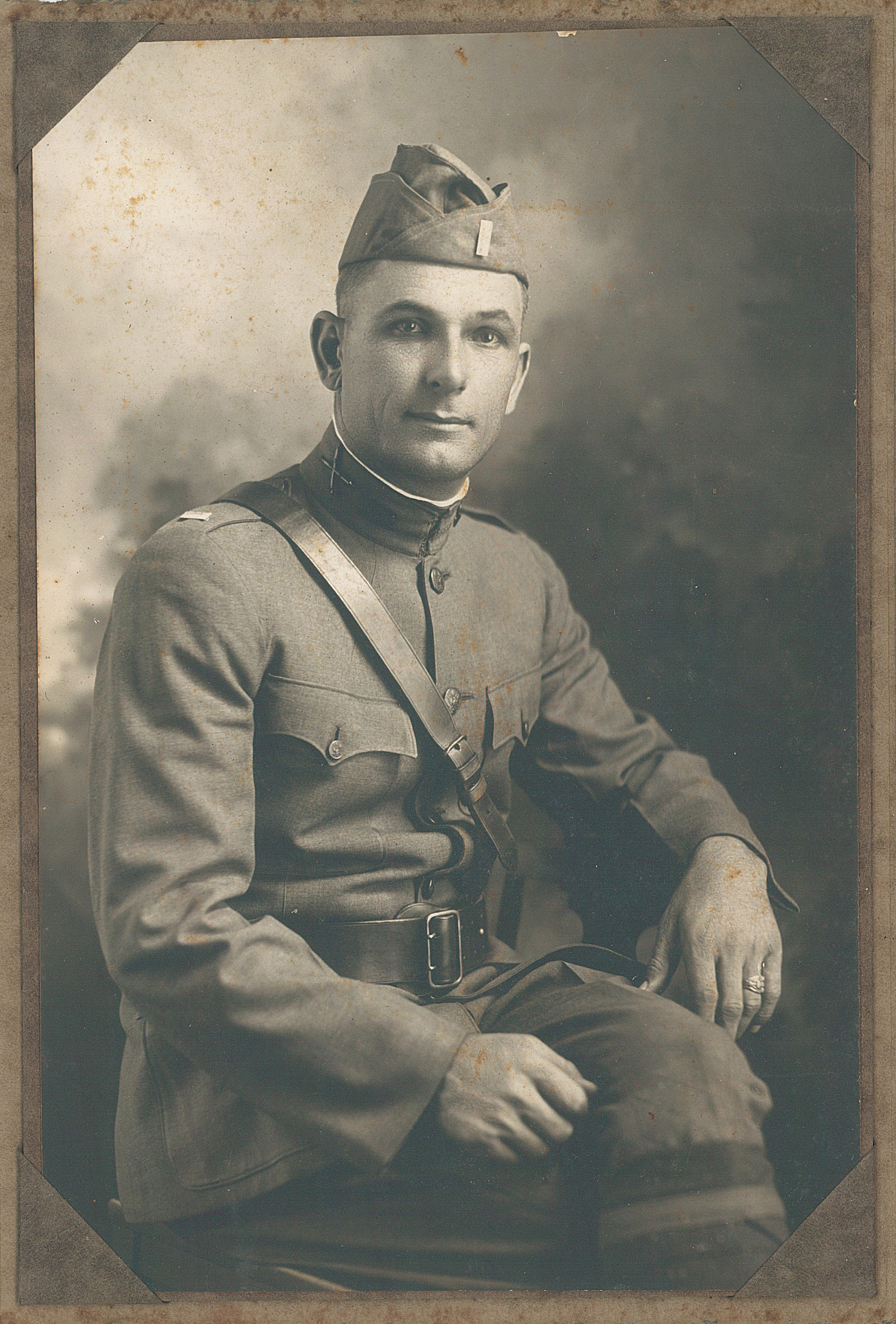
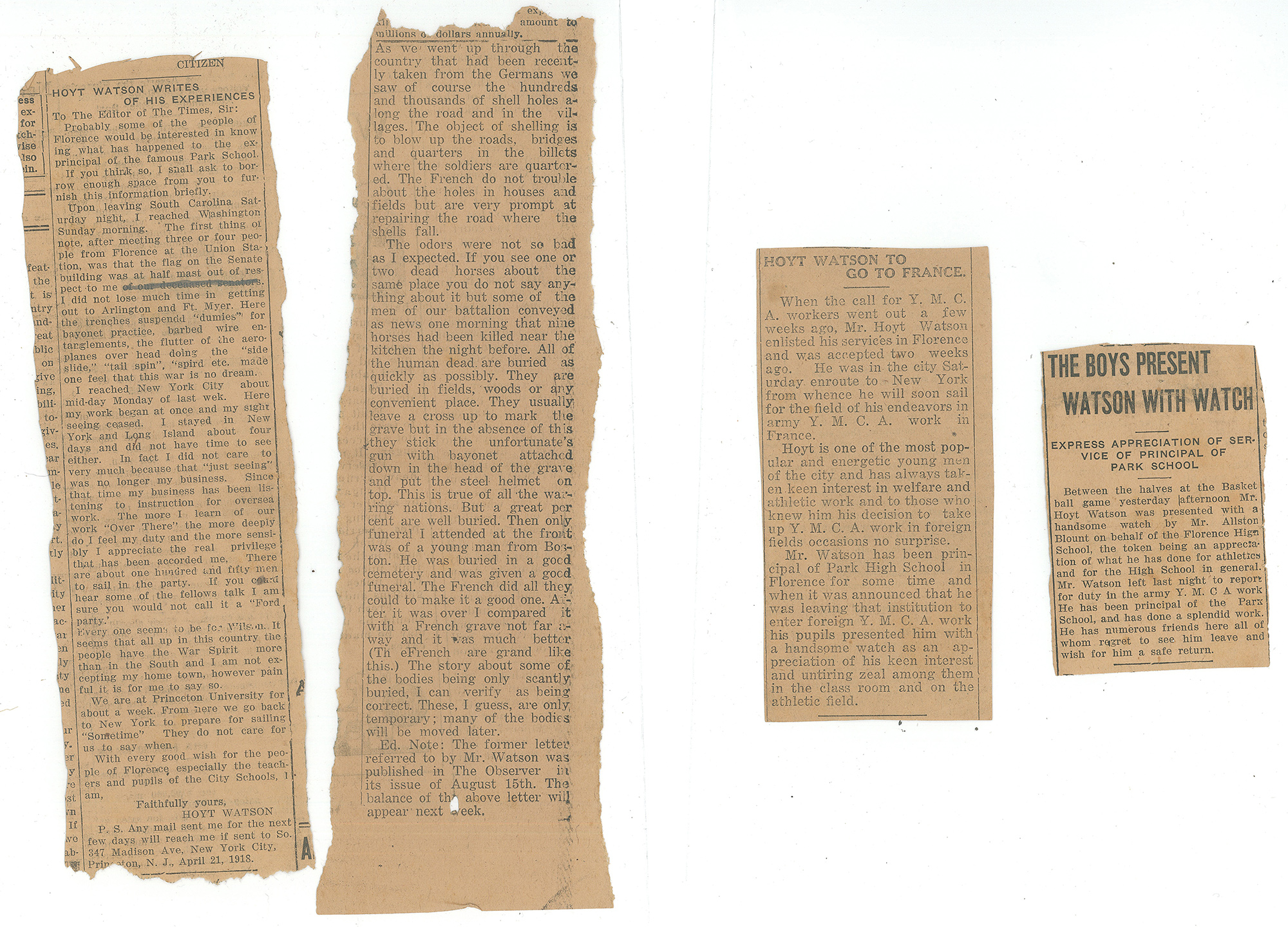
Hoyt Watson Writes of His Experiences
To The Editor of The Times, Sir:
Probably some of the people of Florence would be interested in knowing what has happened to the ex-principal of the famous Park School.
If you think so, I shall ask to borrow enough space from you to furnish this information briefly.
Upon leaving South Carolina Saturday night, I reached Washington Sunday morning. The first thing of note, after meeting three or four people from Florence at the Union Station, was that the flag on the Senate building was at half mast out of respect to me –of our deceased senators.– I did not lose much time in getting out to Arlington and Ft. Myer. Here the trenches suspend “dumies” for bayonet practice, barbed wire entanglements, the flutter of the airplanes over head doing the “side slide,” “tail spin” “spird etc. made one feel that this war is no dream.
I reached New York City about mid-day Monday of last week. Here my work began at once and my sight seeing ceased. I stayed in New York and Long Island about four days and did not have time to see either. In fact I did not care to very much because that “just seeing” was no longer my business. Since that time my business has been listening to instruction for oversea work. The more I learn of our work “Over There” the more deeply do I feel my duty and the more sensibly I appreciate the real privilege that has been accorded me. There are about one hundred and fifty men to sail in the party. If you could hear some of the fellows talk I am sure you would not call it a “Ford party.”
Every one seems to be for (President Woodrow) Wilson. It seems that all up in this country the people have the War Spirit more than in the South and I am not excepting my home town, however painful it is for me to say so.
We are at Princeton University for about a week. From here we go back to New York to prepare for sailing “Sometime.” They do not care for us to say when.
With every good wish for the people of Florence especially the teachers and pupils of the City Schools, I am,
Faithfully yours,
Hoyt Watson
P. S. Any mail sent me for the next few days will reach me if sent to So. 347 Madison Ave, New York City, Princeton, N. J., April 21, 1918.
–
As we went up through the country that had been recently taken from the Germans we saw of course the hundreds and thousands of shell holes along the road and in the villages. The object of shelling is to blow up the roads, bridges and quarters in the billets where the soldiers are quartered. The French do not trouble about the holes in houses and fields but are very prompt at repairing the road where the shells fall.
The odors were not so bad as I expected. If you see one or two dead horses about the same place you do not say anything about it but some of the men of our battalion conveyed as news one morning that nine horses had been killed near the kitchen the night before. All of the human dead are buried as quickly as possible. They are buried in fields, woods or any convenient place. They usually leave a cross up to mark the grave but in the absence of this they stick the unfortunate’s gun with bayonet attached down in the head of the grave and put the steel helmet on top. This is true of all the warring nations. But a great percent are well buried. The only funeral I attended at the front was of a young man from Boston. He was buried in a good cemetery and was given a good funeral. The French did all they could to make it a good one. After it was over I compared it with a French grave not far away and it was much better (The French are grand like this.) The story about some of the bodies being only scantly buried, I can verify as being correct. These, I guess, are only temporary; many of the bodies will be moved later.
Ed. Note: The former letter referred to by Mr. Watson was published in The Observer in its issue of August 15th. The balance of the above letter will appear next week.
Hoyt Watson to Go to France.
When the call for Y. M. C. A. workers went out a few weeks ago, Mr. Hoyt Watson enlisted his services in Florence and was accepted two weeks ago. He was in the city Saturday enroute to New York from whence he will soon sail for the field of his endeavors in army Y. M. C. A. work in France.
Hoyt is one of the most popular and energetic young men of the city and has always taken keen interest in welfare and athletic work and to those who knew him his decision to take up Y. M. C. A. work in foreign fields occasions no surprise.
Mr. Watson has been principal of Park High School in Florence for some time and when it was announced that he was leaving that institution to enter foreign Y. M. C. A. work his pupils presented him with a handsome watch as an appreciation of his keen interest in untiring zeal among them in the class room and on the athletic field.
The Boys Present Watson with Watch
Express appreciation of service of principal of Park School
Between the halves at the Basketball game yesterday afternoon Mr. Hoyt Watson was presented with a handsome watch by Mr. Allston Blount on behalf of the Florence High School, the token being an appreciation of what he has done for athletics and for the High School in general. Mr. Watson left last night to report for duty in the army Y. M. C. A. work. He has been principal of the Park School, and has done a splendid work. He has numerous friends here all of whom regret to see him leave and wish for him a safe return.
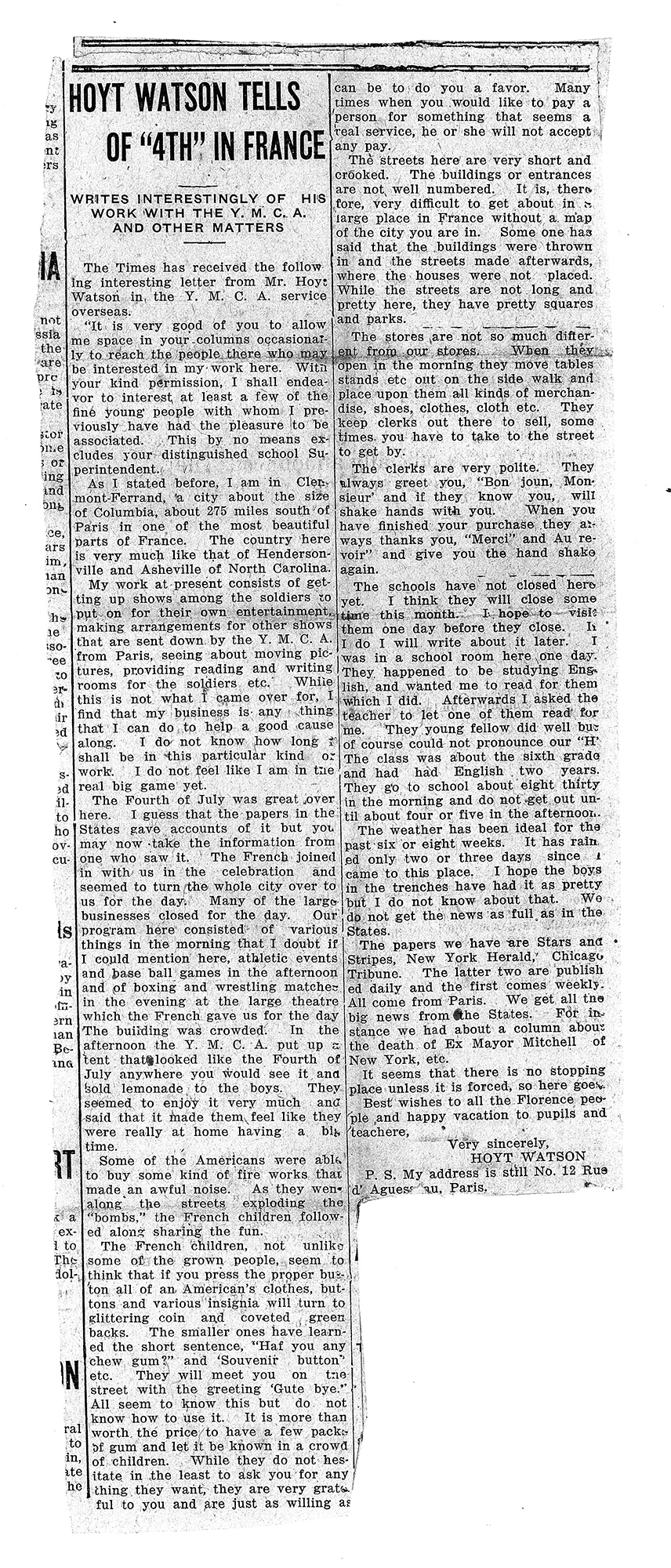
Hoyt Watson Tells of “4th” in France
Writes interestingly of his work with the Y. M. C. A. and other matters
The Times has received the following interesting letter from Mr. Hoyt Watson in the Y. M. C. A. service overseas.
“It is very good of you to allow me space in your columns occasionally to reach the people there who may be interested in my work here. With your kind permission, I shall endeavor to interest at least a few of the fine young people with whom I previously have had the pleasure to be associated. This by no means excludes your distinguished school Superintendent.
As I stated before, I am in Clermont-Ferrand, a city about the size of Columbia, about 275 miles south of Paris in one of the most beautiful parts of France. The country here is very much like that of Hendersonville and Asheville of North Carolina.
My work at present consists of getting up shows among the soldiers to put on for their own entertainment, making arrangements for other shows that are sent down by the Y. M. C. A. from Parish, seeing about moving pictures, providing reading and writing rooms for the soldiers etc. While this is not what I came over for, I find that my business is any thing that I can do to help a good cause along. I do not know how long I shall be in this particular kind of work. I do not feel like I am in the real big game yet.
The Fourth of July was great over here. I guess that the papers in the States gave accounts of it but you may now take the information from one who saw it. The French joined in with us in the celebration and seems to turn the whole city over to us for the day. Many of the large businesses closed for the day. Our program here consisted of various things in the morning that I doubt if I could mention here, athletic events and base ball games in the afternoon and of boxing and wrestling matches in the evening at the large theatre which the French gave us for the day. The building was crowded. In the afternoon the Y. M. C. A. put up a tent that looked like the Fourth of July anywhere you would see it and sold lemonade to the boys. They seemed to enjoy it very much and said that it made them feel like they were really at home having a big time.
Some of the Americans were able to buy some kind of fire works that made an awful noise. As they went along the streets exploding the “bombs,” the French children followed along sharing the fun.
The French children, not unlike some of the grown people, seem to think that if you press the proper button all of an American’s clothes, buttons and various insignia will turn to glittering coin and coveted green backs. The smaller ones have learned the short sentence, “Haf you any chew gum?” and “Souvenir button” etc. They will meet you on the street with the greeting “Gute bye.” All seem to know this but do not know how to use it. It is more than worth the price to have a few packs of gum and let it be known in a crowd of children. While they do not hesitate in the least to ask you for anything they want, they are very grateful to you and are just as willing as can be to do you a favor. Many times when you would like to pay a person for something that seems a real service, he or she will not accept any pay.
The streets here are very short and crooked. The buildings or entrances are not well numbered. It is, there fore, very difficult to get about in a large place in France without a map of the city you are in. Some one has said that the buildings were thrown in and the streets made afterwards, where the houses were not placed. While the streets are not long and pretty here, they have pretty squares and parks.
The stores are not so much different from our stores. When they open in the morning they move tables stands etc out on the side walk and place upon them all kinds of merchandise, shoes, clothes, cloth etc. They keep clerks out there to sell, some times you have to take to the street to get by.
The clerks are very polite. They always greet you, “Bon joun, Monsieur” and if they know you, will shake hands with you. When you have finished your purchase they always thank you, “Merci” and “Au revoir” and give you the hand shake again.
The schools have not closed here yet. I think they will close some time this month. I hope to visit them one day before they close. If I do I will write about it later. I was in a school room here one day. They happened to be studying English, and wanted me to read for them which I did. Afterwards I asked the teacher to let one of them read for me. The young fellow did well but of course could not pronounce our “H”. The class was about the sixth grade and had English two years. They go to school about eight thirty in the morning and do not get out until about four or five in the afternoon.
The weather has been ideal for the past six or eight weeks. It has rained only two or three days since I came to this place. I hope the boys in the trenches have had it as pretty but I do not know about that. We do not get the news as full as in the States.
The papers we have are Stars and Stripes, New York Herald, Chicago Tribune. The latter two are published daily and the first comes weekly. All come from Paris. We get all the big news from the States. For instance we heard about a column about the death of Ex Mayor Mitchell of New York, etc.
It seems that there is no stopping place unless it is forced, so here goes.
Best wishes to all the Florence people and happy vacation to pupils and teachers,
Very sincerely,
Hoyt Watson
P. S. My address is still No. 12 Rue d’Aguesseau, Paris.

Letters from the Boys Over There
Mr. Hoyt Watson who is with the American Y. M. C. A. overseas service in France writes to the Times as follows: His letter is postmarked “Paris, France.”
“Again I am asking enough space of you to inform the good people of the Gate City concerning my work, etc. A copy of my last letter as it appeared in the Times was sent me by a friend. I thank you and him.
Our party left the States a few days earlier than we expected to leave, which early sailing caused me to miss several letters that should have been mine in the U. S. These, however, reached me over here. Every phrase and word of each letter and card were greatly enjoyed, I assure you.
While in Paris I received the series of letters from both the sixth grade and section A of seventh grade. Since then I received several letters and cards amounting to about twenty (all in one package). What feast! I couldn’t work. I shall try to steal enough time soon to write each one but for the present shall impose upon the good nature of the Times to reach all at one time.
I wrote some of you that we were in London for several days. Not having many duties to perform there, we saw the big places of the city. One special privilege, which I enjoyed was that of visiting the House of Commons and House of Lords while they were in session.
I do not suppose that I am permitted to tell all about our trip from London to Paris but I guess it is safe to say that there was not the slightest suggestion of excitement.
Paris to me was the same as you read of—beautiful. The people were so polite and accommodating that I was really ashamed sometimes. Some of us were in Paris longer than in London and of course we saw the bulk of the city.
By the way, as we were entering the city, the alarm was being given of an approaching air raid but that was about all we heard that night. Though several nights later it was our turn to witness a real beautiful raid. I say it was beautiful because the barrage sent up by the French that night could hardly be spoken of otherwise. I spent the night up on the top story of the hotel trying to see the whole German squadron come down in flames, but the steady bursting of the shells lighting the clouds and the sky was all I saw. They brought down one but I did not see it even after my diligent watch.
While both London and Paris are beautiful neither nor both combined are as pretty as some parts of country France. The artist with his brush could probably tell you, I can’t. It is certainly worth fighting for.
At present I am a pitifully long way from the front. Can’t say how long I shall be here. While I like my work very much and enjoy all the surroundings, I would like at least some more active service. For the present I am feeling fine, satisfied and fully confident.
Mr. Brooker wrote me that the basket ball girls wanted to wire me the results of their famous championship game, but did not know my address. I appreciate that very much and appreciate more and much more the honors they brought back to Florence. The girls and Miss Mears certainly deserve great credit for the enviable record they have established. It is grand. I am real anxious to know the results of the debating teams and the base ball games, the annual and all those things.
There are many interesting things happening over here. I will tell you some of these later; but can’t help telling that I saw milk delivered this morning in French style. Eleven black goats were hunched on the side walk and street. A customer paid the owner a stated amount and approached one of the little butt headed females. With his pail in hand he extracted the white fluid to the amount of the coin exchanged and the drove proceeded on down the street.
Best o’ luck to every one. Happy vacation to Mr. Brooker, teachers and pupils.
Very sincerely.
Hoyt Watson
No. 12 Rue d’ Aguesseau, Paris.
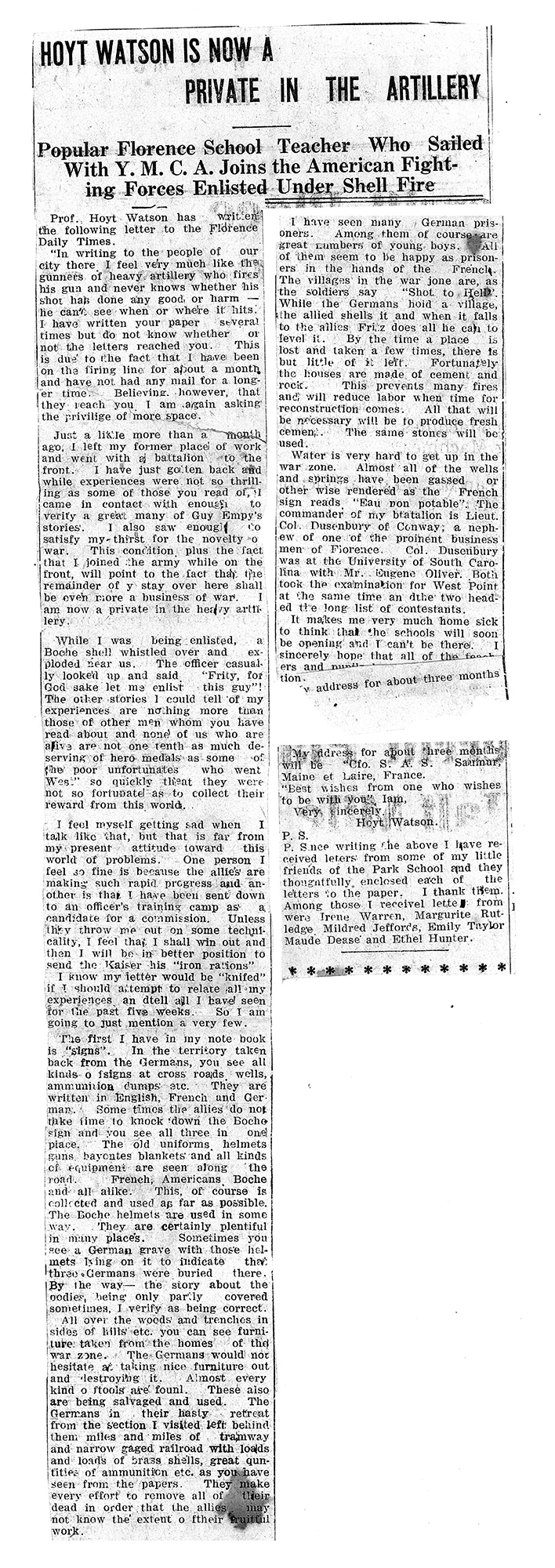
Hoyt Watson is Now a Private in the Artillery
Popular Florence School Teacher Who Sailed with Y. M. C. A. Joins the American Fighting Forces Enlisted Under Shell Fire
Prof. Hoyt Watson has written the following letter to the Florence Daily Times.
“In writing to the people of our city there I feel very much like the gunners of heavy artillery who fires his gun and never knows whether his shot has done any good or harm — he can’t see when or where it hits. I have written your paper several times but do not know whether or not the letters reached you. This is due to the fact that I have been on the firing line for about a month and have not had any mail for a longer time. Believing, however, that they reach you I am again asking the privilege of more space.
Just a little more than a month ago, I left my former place of work and went with a battalion to the front. I have just gotten back and while experiences were not so thrilling as some of those you read of, I came in contact with enough to verify a great many of Guy Empy’s stories. I also saw enough to satisfy my thirst for the novelty of war. This condition plus the fact that I joined the army while on the front, will point to the fact that the remainder of my stay over here shall be even more a business of war. I am now a private in the heavy artillery.
While I was being enlisted, a Boche shell whistled over and exploded near us. The officer casually looked up and said, “Frity, for God sake let me enlist this guy”! The other stories I could tell of my experiences are nothing more than those of other men whom you have read about and none of us who are alive are not one tenth as much deserving of hero medals as some of the poor unfortunates who went “West” so quickly that they were not so fortunate as to collect their reward from this world.
I feel myself getting sad when I talk like that, but that is far from my present attitude toward this world of problems. One [reason] I feel so fine is because the allies are making such rapid progress and another is that I have been sent down to an officer’s training camp as a candidate for a commission. Unless they throw me out on some technicality, I feel that I shall win out and then I will be in better position to send the Kaiser his “iron rations”.
I know my letter would be “knifed” if I should attempt to relate all my experiences and tell all I have seen for the past five weeks. So I am going to just mention a very few.
The first I have in my note book is “signs”. In the territory taken back from the Germans, you see all kinds of signs at cross roads, wells, ammunition dumps etc. They are written in English, French and German. Some times the allies do not take the time to knock down the Boche sign and you see all three in one place. The old uniforms, helmets, guns, bayonets, blankets and all kinds of equipment are seen along the road. French, Americans, Boche and all alike. This, of course is collected and used as far as possible. The Boche helmets are used in some way. They are certainly plentiful in many places. Sometimes you see a German grave with those helmets lying on it to indicate that three Germans were buried there. By the way — the story about the bodies being only partly covered sometimes, I verify as being correct.
All over the woods and trenches in sides of hills etc. you can see furniture taken from the homes of the war zone. The Germans would not hesitate at taking nice furniture out and destroying it. Almost every kind of tools are found. These also are being salvaged and used. The Germans in their hasty retreat from the section I visited left behind them miles and miles of tramway and narrow gaged railroad with loads and loads of brass shells, great quantities of ammunition ets. as you have seen from the papers. They make every effort to remove all of their dead in order that the allies may not know the extent of their fruitful work.
I have seen many German prisoners. Among them of course are great numbers of young boys. All of them seem to be happy as prisoners in the hands of the French. The villages in the war zone are, as the soldiers say “Shot to Hell”. While the Germans hold a village, the allied shells it and when it falls to the allies Fritz does all he can to level it. By the time a place is lost and taken a few times, there is but little of it left. Fortunately the houses are made of cement and rock. This prevents many fires and will reduce labor when time for reconstruction comes. All that will be necessary will be to produce fresh cement. The same stones will be used.
Water is very hard to get up in the war zone. Almost all of the wells and springs have been gassed or other wise rendered as the French sign ready “Eau non potable”. The commander of my battalion is Leiut. Col. Dusenbury of Conway, a nephew of one of the prominent business men of Florence. Col Dusenbury was at the University of South Carolina with Mr. Eugene Oliver. Both took the examination for West Point at the same time and the two headed the long list of contestants.
It makes me very much home sick to think that the schools will soon be opening and I can’t be there. I sincerely hope that all of the teachers and pupils (text obscured).
My address for about three months will be “Cfo. S. A. S. Saumur, Maine et Loire, France.
“Best wishes from one who wishes to be with you” I am
Very sincerely,
Hoyt Watson.
P. S.
P. Since writing the above I have received letters from some of my little friends of the Park School and they thoughtfully enclosed each of the letters to the paper. I thank them. Among those I received letters from were Irene Warren, Margurite Rutledge, Mildred Jeffords, Emily Taylor, Maude Dease and Ethel Hunter.
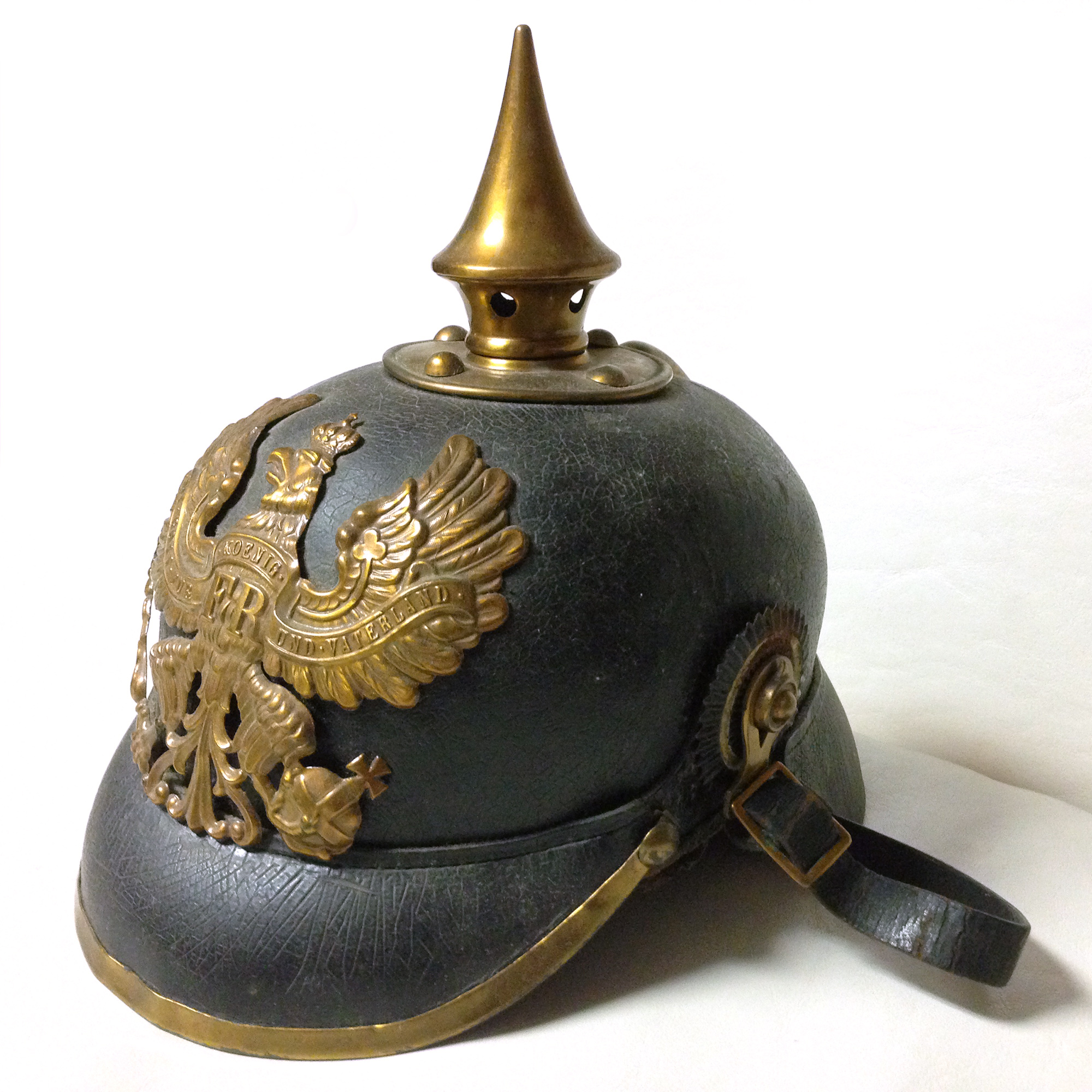
Pickelhaube (“Kaiser” helmet)
molded leather with brass accoutrements Germany
WWI
The leather construction of these helmets offered little protection against the conditions of trench warfare. Due to this, the German army began to replace the pickelhaube with a steel helmet - stahlhelm - around 1916. The pickelhaube was no longer German military-issue after 1918. Watson mentions several helmets in his diary, all of which he obtained after the Armistice. This one was acquired in the French town of Cosne-Cours-sur-Loire, while traveling with his regiment on a troop train to Brest.



